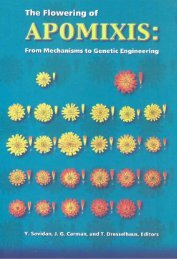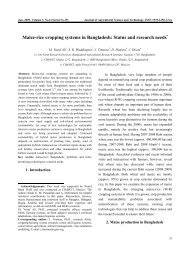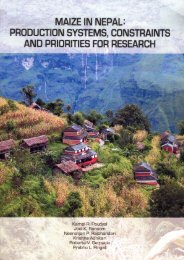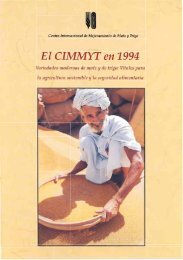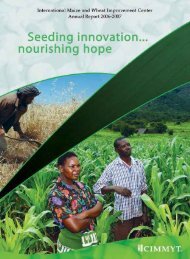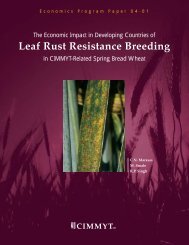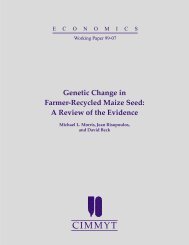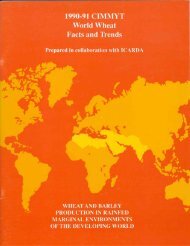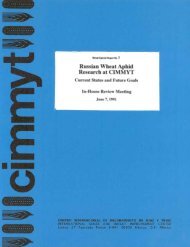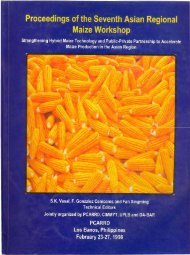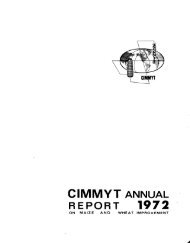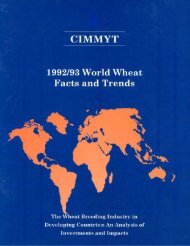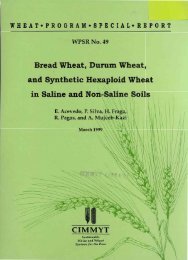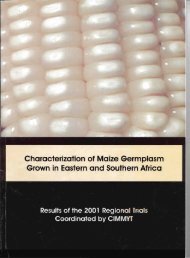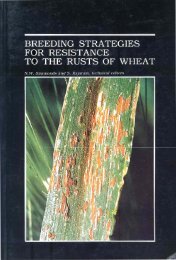the Symposium on Wheats for More Tropical Environments - cimmyt
the Symposium on Wheats for More Tropical Environments - cimmyt
the Symposium on Wheats for More Tropical Environments - cimmyt
- No tags were found...
You also want an ePaper? Increase the reach of your titles
YUMPU automatically turns print PDFs into web optimized ePapers that Google loves.
32Yield-The last character to bementi<strong>on</strong>ed here Is yield. Althoughcorrelati<strong>on</strong> with latitude Is not high. itIs certain that yield Is. generallyspeaking. reduced in <str<strong>on</strong>g>the</str<strong>on</strong>g> tropics. Thisfact. however. must be viewed in <str<strong>on</strong>g>the</str<strong>on</strong>g>c<strong>on</strong>text of earliness or maturity.Measured in producti<strong>on</strong> per day. a 100day crop of 2 t/ha in <str<strong>on</strong>g>the</str<strong>on</strong>g> tropicscorresp<strong>on</strong>ds to a ISO-day crop of 3 t/hain temperate z<strong>on</strong>es. In many areas. this<strong>for</strong>ced maturity Is a major advantage ofwheat as it factlitates <str<strong>on</strong>g>the</str<strong>on</strong>g> grOwing ofasec<strong>on</strong>d crop and sometimes even athird crop. It must also be rememberedthat <str<strong>on</strong>g>the</str<strong>on</strong>g> average yields of major wheatproducers such as Australia andArgentina were 1.2 and 1.5 tlha.respectively. <strong>for</strong> <str<strong>on</strong>g>the</str<strong>on</strong>g> 1979 to 1981period (4). What is most important <strong>for</strong>small farmers is <str<strong>on</strong>g>the</str<strong>on</strong>g> fact that smallmanagement mistakes. which wouldnormally cause minor yield reducti<strong>on</strong>sin temperate climates. can lead tocomplete crop fallures in <str<strong>on</strong>g>the</str<strong>on</strong>g> tropics.AgroDomyAgr<strong>on</strong>omic knowledge about wheatgrown in temperate envir<strong>on</strong>mentsneeds to be rechecked under hotclimate circumstances. The followingagr<strong>on</strong>omic factors probably do notc<strong>on</strong>stitute a complete list of <str<strong>on</strong>g>the</str<strong>on</strong>g>problems which will be encountered in<str<strong>on</strong>g>the</str<strong>on</strong>g> tropics.Weeds-Weed species are oftendifferent in <str<strong>on</strong>g>the</str<strong>on</strong>g> tropics. e.g.• volunteerrice in rice-wheat rotati<strong>on</strong>s. Highertemperatures may also cause <str<strong>on</strong>g>the</str<strong>on</strong>g> effectsof herbicides to be different.Ferttlizers-Fertilizati<strong>on</strong> Is generallyneeded. because tropical solls are oftenpoor in nutrients. The short growingseas<strong>on</strong> but fast decompositi<strong>on</strong> has to bec<strong>on</strong>sidered in relati<strong>on</strong> to basal versussplit applicati<strong>on</strong>s.seed bed preparati<strong>on</strong>-Special tnlagepractices may be necessary <strong>for</strong>moisture c<strong>on</strong>servati<strong>on</strong>. because ofwaterlogging problems or heavy solls.SoWing depth-Fur<str<strong>on</strong>g>the</str<strong>on</strong>g>r investigati<strong>on</strong> isneeded here In relati<strong>on</strong> to standestablishment and subsequent plantdevelopment.These factors are complicated by <str<strong>on</strong>g>the</str<strong>on</strong>g>str<strong>on</strong>g interacti<strong>on</strong>s between <str<strong>on</strong>g>the</str<strong>on</strong>g>m andalso by n<strong>on</strong>agr<strong>on</strong>omic factors. such asvariety and <str<strong>on</strong>g>the</str<strong>on</strong>g> socioec<strong>on</strong>omicc<strong>on</strong>diti<strong>on</strong>s of <str<strong>on</strong>g>the</str<strong>on</strong>g> farmers grOwing <str<strong>on</strong>g>the</str<strong>on</strong>g>wheat.Seed productioDThe producti<strong>on</strong> of seed must receivespecial attenti<strong>on</strong>. since <str<strong>on</strong>g>the</str<strong>on</strong>g> seedmultiplicati<strong>on</strong> rate is slower undertropical c<strong>on</strong>diti<strong>on</strong>s. because of reducedtillertng and generally lower yieldlevels. The short growing cycle. <strong>on</strong> <str<strong>on</strong>g>the</str<strong>on</strong>g>o<str<strong>on</strong>g>the</str<strong>on</strong>g>r hand. permits two crops per year.ifsuitable areas <strong>for</strong> off-seas<strong>on</strong> sowingcan be identified. This necessitatesmoving to high elevati<strong>on</strong>s. which areoften intensively cropped withvegetables or o<str<strong>on</strong>g>the</str<strong>on</strong>g>r high-value crops. orshipping seed between countries. whichcan be very expensive and involve agreat deal of logistical support.Seed .torageStorage Is a big problem in <str<strong>on</strong>g>the</str<strong>on</strong>g> tropics.especially under hot and humidc<strong>on</strong>diti<strong>on</strong>s. Technical soluti<strong>on</strong>s suitable<strong>for</strong> storage <strong>on</strong>-farm. in <str<strong>on</strong>g>the</str<strong>on</strong>g> village andat nati<strong>on</strong>al levels would greatlyfactlitate <str<strong>on</strong>g>the</str<strong>on</strong>g> introducti<strong>on</strong> of wheat Inmany areas. Grain storage is generallygiven high priority but. at harvest.many farmers do not know whe<str<strong>on</strong>g>the</str<strong>on</strong>g>r<str<strong>on</strong>g>the</str<strong>on</strong>g>y will use <str<strong>on</strong>g>the</str<strong>on</strong>g>ir grain <strong>for</strong> food or <strong>for</strong>seed. There<strong>for</strong>e. <str<strong>on</strong>g>the</str<strong>on</strong>g> use of chemicals<strong>for</strong> pest c<strong>on</strong>trol must be c<strong>on</strong>Sideredcarefully.NODtechDlcal problem.Previously. problems specific to tropicalc<strong>on</strong>diti<strong>on</strong>s have been discussed. but <str<strong>on</strong>g>the</str<strong>on</strong>g>introducti<strong>on</strong> of wheat Into a country



